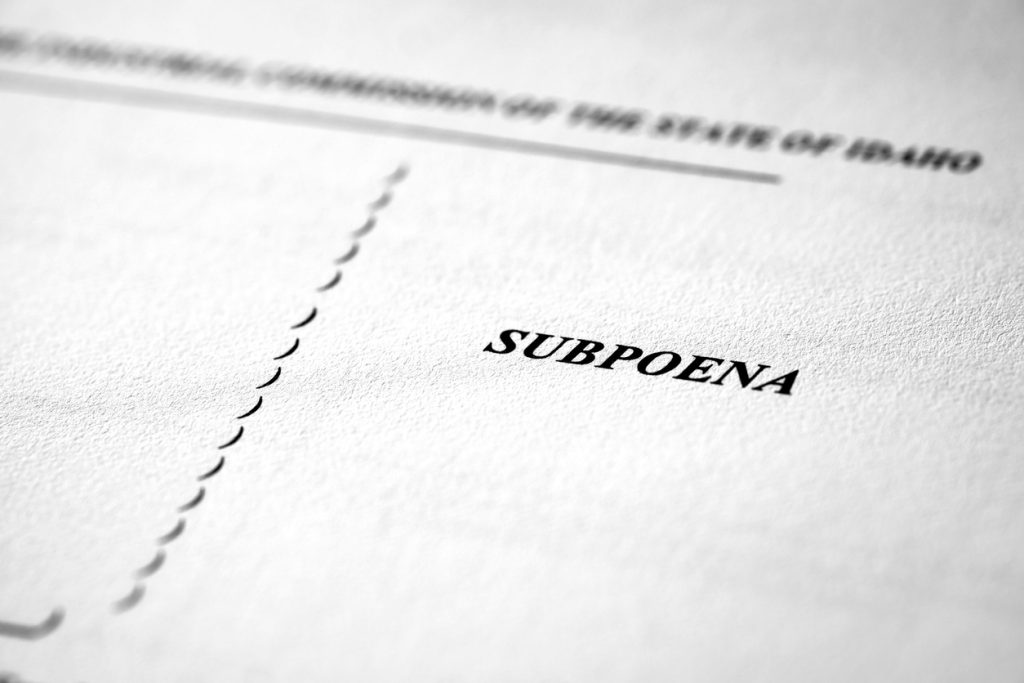When a business or individual is targeted in an Office of Foreign Assets Control (OFAC) investigation, one of the most critical steps is responding properly to an administrative subpoena. These subpoenas demand extensive documentation, and failure to provide accurate or complete responses can lead to penalties, including hefty fines and restrictions on international transactions. Experienced administrative subpoenas attorneys emphasize that preparation is key, and the foundation of preparation lies in a carefully curated document checklist. By identifying and organizing relevant records early, targets of OFAC investigations can respond within the required timeframe and avoid unnecessary complications.
This article explores the importance of documentation in OFAC matters, outlines the types of records that typically appear on a subpoena checklist, and explains how experienced administrative subpoenas attorneys structure responses to comply with both investigative demands and broader U.S. sanctions law.
Why OFAC Issues Administrative Subpoenas
Administrative subpoenas are issued by OFAC to compel the production of records in connection with possible sanctions violations. Unlike a criminal subpoena, these investigative demands focus heavily on financial, transactional, and compliance-related documentation. The scope of an OFAC subpoena can be broad, reaching into years of business activity, communications, and banking records.
The purpose is to determine whether transactions violated U.S. sanctions programs, such as prohibitions against dealings with embargoed countries, blocked entities, or sanctioned individuals. Experienced administrative subpoenas attorneys stress that these subpoenas serve not just as requests but as legally binding obligations. Noncompliance can lead to civil enforcement actions, loss of licenses, and referral to the Department of Justice for criminal prosecution.

How Experienced Administrative Subpoenas Attorneys Build a Document Checklist
Developing a checklist is the first step toward compliance. The goal is to identify categories of documents commonly requested and ensure they are preserved, organized, and produced in accordance with OFAC’s requirements. Experienced administrative subpoenas attorneys approach this process methodically, often beginning with a detailed review of the subpoena itself. From there, they break down each request into practical categories, such as financial records, correspondence, compliance programs, and corporate structures.
The checklist is not static. It must be adapted to the scope of each investigation and tailored to the unique operations of the entity under review. For example, a shipping company may be asked for bills of lading and port documentation, while a financial institution might face broader demands related to international transfers.
Financial Records as a Central Focus
Financial records are always a priority for OFAC investigators. Bank statements, wire transfer confirmations, payment records, and transaction ledgers provide a clear picture of whether funds moved in violation of sanctions. Experienced administrative subpoenas attorneys highlight that OFAC often traces patterns of activity over time, making it necessary to provide multiple years of records.
OFAC also expects records to be cross-referenced. A payment record may need to be supported by an invoice, contract, or shipping document. When compiling a checklist, attorneys emphasize the importance of connecting each financial entry to supporting documentation to demonstrate legitimacy.
Corporate Structure and Ownership Documentation
Another category frequently appearing on a checklist involves corporate records. OFAC is particularly interested in ownership structures, subsidiaries, and affiliates. Because sanctions often apply to entities controlled by sanctioned individuals or companies, OFAC subpoenas typically request formation documents, shareholder lists, partnership agreements, and organizational charts.
Experienced administrative subpoenas attorneys recognize the importance of transparency here. Attempting to obscure beneficial ownership can result in allegations of willful violations. Proper documentation of ownership, control, and governance helps establish that business activities were not designed to circumvent sanctions.
Compliance Programs and Internal Policies
A well-documented compliance program can significantly impact the outcome of an OFAC investigation. Companies are often asked to provide manuals, training materials, audit reports, and internal memoranda related to sanctions compliance. Experienced administrative subpoenas attorneys advise that producing evidence of compliance efforts demonstrates good faith and may influence whether OFAC pursues penalties.
Checklists in this category typically include written policies, employee training logs, internal audit results, and records of compliance committee meetings. These materials show not only that policies existed but also that they were actively implemented.

Communications and Correspondence
Email correspondence, contracts, and other communications are commonly requested. OFAC seeks to understand the intent behind transactions, particularly when there is ambiguity in the financial or shipping records. Experienced administrative subpoenas attorneys note that these records can either clarify compliance or raise red flags.
A subpoena checklist may require searching across multiple custodians, including executives, compliance officers, and front-line employees. Preserving and producing these communications promptly reduces the risk of allegations of spoliation or obstruction.
Shipping and Logistics Records
In industries involving physical goods, OFAC frequently requests documents such as bills of lading, customs declarations, cargo manifests, and freight forwarder agreements. These records help confirm whether goods were shipped to or from sanctioned jurisdictions. Experienced administrative subpoenas attorneys highlight that discrepancies between invoices and shipping records are often at the center of OFAC enforcement cases.
Maintaining an organized repository of logistics records ensures that responses can be made quickly and accurately.
The Importance of Timeliness in Document Production
Meeting OFAC’s deadlines is a non-negotiable aspect of responding to a subpoena. Extensions are sometimes possible, but OFAC expects timely and complete responses. Experienced administrative subpoenas attorneys underscore that delayed or partial production not only increases penalties but can also damage credibility with investigators.
This is where a document checklist becomes indispensable. By categorizing and organizing records at the outset, attorneys ensure production is systematic rather than reactive.
Risks of Incomplete or Improper Documentation
Providing incomplete or disorganized records creates significant risk. OFAC can interpret missing documents as evidence of concealment or willful violation. In some cases, failure to produce documents may even be treated as a separate violation under sanctions regulations. Experienced administrative subpoenas attorneys caution that every document on the checklist should be reviewed for accuracy, completeness, and consistency.
Producing materials without context is equally risky. For example, a payment record without an accompanying contract may suggest a sanctions breach even if the transaction was legitimate.
Legal Authority and Government Oversight
OFAC operates under statutory authority delegated by the President and the Department of the Treasury. Its power to issue administrative subpoenas is backed by federal law, and the agency’s enforcement actions are well-documented in published guidelines. For reference, the U.S. Department of the Treasury’s official website provides direct access to regulations, sanctions lists, and compliance frameworks that often guide subpoena responses.
By consulting both official guidance and tailored legal analysis, organizations can align their document production with established enforcement standards.
Integrating the Checklist into Broader Defense Strategies
The checklist is not just a tool for compliance but also a foundation for legal strategy. Attorneys use organized documentation to identify potential vulnerabilities, assess exposure, and prepare defenses. For example, financial records may reveal inadvertent violations that can be mitigated through voluntary disclosure. Similarly, compliance manuals may demonstrate that any violations occurred despite robust preventative measures.
When documentation is complete and well-structured, it also supports negotiations with OFAC, potentially leading to reduced penalties or alternative resolutions. This is where collaboration with experienced administrative subpoenas attorneys becomes essential. Through careful planning, they integrate the checklist into a broader response strategy that balances compliance with advocacy.

Using Experienced Administrative Subpoenas Attorneys for OFAC Compliance
Responding to OFAC subpoenas requires not only thorough documentation but also a clear understanding of sanctions law. Businesses and individuals facing such investigations often benefit from working with legal counsel who can structure a comprehensive response. Guidance from experienced administrative subpoenas attorneys ensures that documents are properly identified, categorized, and contextualized, reducing the risk of enforcement escalation.
For example, firms providing sanctions defense services detail how they support clients in responding to investigative demands. As outlined on this resource about experienced administrative subpoenas, the approach combines meticulous document review with legal strategy to strengthen responses.
Conclusion
An OFAC administrative subpoena can be overwhelming, but with preparation, compliance, and strategic planning, businesses and individuals can navigate the process effectively. The foundation of an effective response lies in a structured checklist that includes financial records, ownership documentation, compliance programs, communications, and shipping data. Experienced administrative subpoenas attorneys design these checklists not only to meet OFAC’s immediate demands but also to build a foundation for broader defense strategies.
In an environment where sanctions enforcement continues to expand, proper documentation and timely responses remain the most reliable safeguards. By understanding the categories of documents most often requested and preparing them proactively, targets of OFAC investigations can protect themselves from unnecessary penalties while demonstrating good faith compliance.
